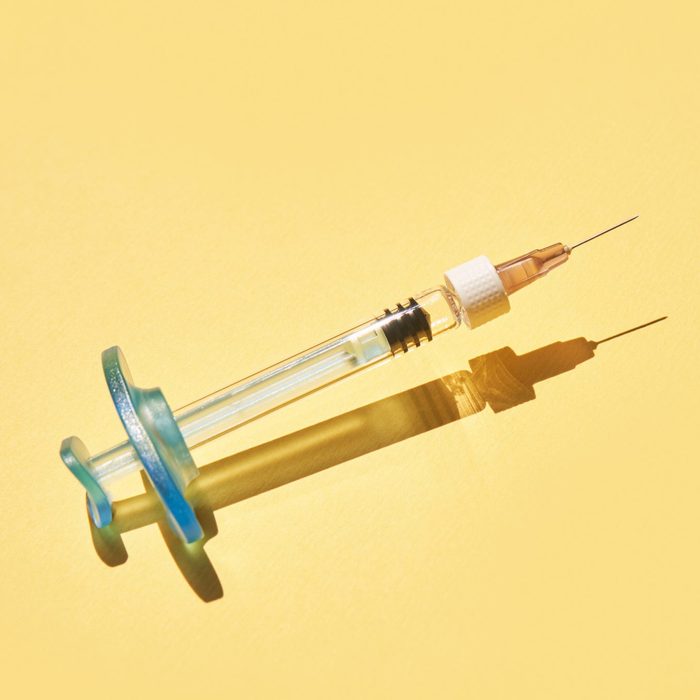New Study: Getting These 3 Vaccines May Reduce Your Alzheimer’s Risk by 30%
Updated: Dec. 03, 2023

Promising new research from the University of Texas suggests this might be one more reason to make sure you're up-to-date on your vaccines as we head into virus season.
‘Tis the season to make a vaccine appointment, and now you may have an even greater push to book one. Data show that those routine vaccines you get do a solid job fighting off the viruses they’re meant to target—now, new research suggests they may be doing impressive double-duty by protecting you from another illness that’s on many Americans’ minds.
Recent findings published in September 2023 in the peer-reviewed Journal of Alzheimer’s Disease suggest that a combination of three specific vaccines may help protect your brain down the road, too.
Paul E. Schulz, MD, senior author of the study and the Umphrey Family Professor in Neurodegenerative Diseases at McGovern Medical School, commented: “The findings suggest to us that vaccination is having a more general effect on the immune system that is reducing the risk for developing Alzheimer’s.”
In May 2022, Dr. McGovern’s team also presented research revealing that getting just one influenza vaccine could reduce Alzheimer’s risk by 40%, compared to those who didn’t get vaccinated.
To investigate further, Dr. Schulz adds about the current study: “We were wondering whether the influenza finding was specific to the flu vaccine. This data revealed that several additional adult vaccines were also associated with a reduction in the risk of Alzheimer’s.”
Which Vaccines Do You Need in 2023-24? Experts’ Recommendations for All Ages
The study: A look at the results
Researchers evaluated older adults aged 65 and above with no history of dementia in the past two years. Over an eight-year period, they compared two groups closely matched in characteristics: One group received vaccinations against tetanus, diphtheria, shingles, and pneumonia, and the other group didn’t. The goal was to determine how much these vaccines influenced the chances of developing Alzheimer’s disease.
The data revealed striking insights. Individuals who received the Tdap/Td vaccine exhibited a 30% decreased risk of Alzheimer’s.
In perspective, 7.2% of the vaccinated group developed the disease, compared to 10.2% of those who weren’t vaccinated. (The researchers’ formula to arrive at the 30% difference was: Risk in unvaccinated – risk in vaccinated / risk in unvaccinated X 100%)
Similarly, those inoculated with the herpes zoster (or shingles) vaccine saw a 25% reduction in Alzheimer’s risk, with 8.1% of the vaccinated cohort developing the condition compared to 10.7% unvaccinated. The pneumococcal vaccine was associated with a 27% diminished risk. In this case, 7.92% of vaccinated patients developed Alzheimer’s, as opposed to 10.9% of their unvaccinated counterparts.
Yaobin Ling, MS, a graduate research assistant at UTHealth Houston, highlights the importance of such findings, stating, “It’s particularly encouraging to observe consistent results across numerous large-scale healthcare databases.”
New Study: This Hot Beverage May Delay Onset of Alzheimer’s Disease
The science behind the findings
The reasons for these surprising benefits are still being explored. Avram Bukhbinder, MD, a pediatric neurology resident at Massachusetts General Hospital and alumnus of UTHealth Houston, suggests that “vaccines may change how the immune system responds to the build-up of toxic proteins that contribute to Alzheimer’s disease.” Dr. Bukhbinder further posits that the vaccines might improve the efficiency of immune cells, enabling them to clear toxic proteins more effectively or modulate the immune response to minimize damage to healthy brain cells.
Furthermore, some vaccines protect against conditions like shingles, which can contribute to neuroinflammation, which is a potential factor in Alzheimer’s development.
5 Symptoms of Alzheimer’s Disease Most People Aren’t Aware of, Say Doctors
The takeaway
While exciting treatments are emerging for Alzheimer’s, they often come with high costs and infrastructure requirements. In contrast, common vaccines, as part of routine adult vaccination schedules, are widely accessible. Kristofer Harris, MPH, a lead author on the study and program manager in the Department of Neurology at UTHealth, drives an important point home: “Our findings are a win for both Alzheimer’s disease prevention research and for public health in general, as this is one more study demonstrating the value of vaccination.”
If you’re looking for a potentially effective way to reduce Alzheimer’s risk, talk to your doctor to ensure you’re up to date on your vaccinations. This discovery, still in its early stages, highlights the potential of combining public health measures with innovative research to combat the devastating effects of Alzheimer’s.
For wellness insights delivered daily, subscribe to The Healthy @Reader’s Digest newsletter and follow The Healthy on Facebook and Instagram. Keep reading:



















